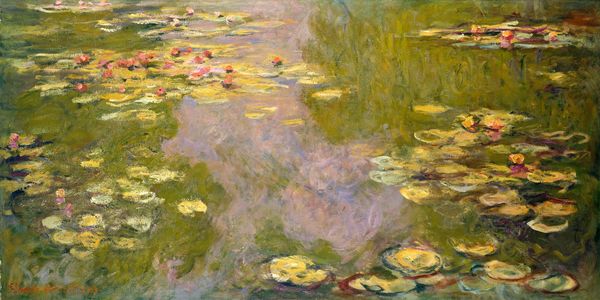 |
| Claude Monet's Water Lilies |
Few people have done more to broaden access to art than Phil Grabsky, who has been instrumental to the creation of over 100 films on the subject for television and the big screen. His latest, I, Claude Monet, tells the life story of the famous impressionist through dozens of his letters, illustrated with his paintings and, in the process, giving them a powerful narrative context. Given his work on The Artist's Garden: American Impressionism last year, I start our interview by asking if the impressionists are his particular favourite area within the wider arc of bringing art to screen.
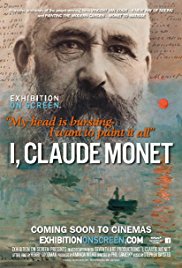 |
| I, Claude Monet poster |
"Well, the most recent film to be finished, on Cézanne, is the 19th Exhibition on Screen. I’m just trying to think how many of those are impressionists. Monet, of course, Cézanne, American Impressionists, Manet; we are doing one right now about Degas. So maybe five out of the 19. It has to be said that of course the period the impressionists were in, I think it’s fair to say, is the most popular genre of art still worldwide. And I think it’s fair to say within that, Monet is one of the favourite artists, and deservedly so.
"Personally, I love making films about all periods. I love a film we made about Hieronymus Bosch, who lived around 500 years ago and I loved a film I recently did about David Hockney, who is obviously still alive. But late 19th century France is extraordinarily interesting and I’ve just come back a couple of days ago from working on a new film about Picasso’s time in Paris, which was tremendously interesting and Monet’s life is just fantastically interesting."
What was it that made him decide to have Monet speak for himself during the film, through those letters?
"Actually, it was a film that we had made about a Royal Academy exhibition called Painting The Modern Garden: Monet To Matisse. And in doing some research on that film it took me back to the letters... reading through some of the letters, I just thought, there’s so much here that offers up a new way of understanding Monet the person and Monet the artist. I looked a bit further and realised there were about 3,300 letters that had survived. It’s quite extraordinary, I don’t know how many of your letters are knocking about but there’s probably only 20 or 30 of mine worldwide, so 3,300, and his art is very biographical, his letters are very biographical.
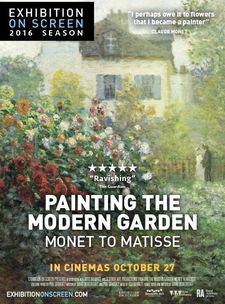 |
| Painting The Modern Garden poster |
"And I thought, this is going to be a film that is not going to be based on an exhibition, if anything it’s my exhibition, I’m the curator if you like. I’m not going to have narration, I’m not going to talk to interviewees, I’m just going to make selections from the letters and reveal much more nuanced Monet. Plus it gives us a real opportunity to look at his artwork. He is, in my opinion, undoubtedly one of the greatest artists ever. And so a relatively straightforward approach, you’ve got the art, you’ve got the letters, you’ve got the locations, but it has been tremendously popular as a film."
Something that I’ve found interesting about it and some of the other films in the series, I tell him, is the way that he focuses a great deal on the process of creation rather than simply the analysis of the pictures themselves. Is that something that he feels hasn’t been done as much in other documentaries about art?
"It does vary from film to film," he says. "Before we started making Exhibition on Screen, deliberately working for the cinema - and I had the idea in 2009 and the first one was in 2011 – we made more than 100 films for television and often we would have Tim Marlowe, for example, standing in front of a painting and talking about it, pulling the painting apart and explaining it. I think that has a value and we do it sometimes – we did a little bit of that with Cézanne – but I think with Monet, I wanted to get a slightly broader understanding of why he was painting, what he was painting, why he was in those locations. It did feel like the focus was a little bit more on trying to understand his biography.
"One of the things about the Impressionists is that they get talked about as this group – in fact they were all extremely different characters. Sometimes people are called Impressionists that weren’t. Manet’s called an Impressionist but he wouldn’t have thought of himself as an Impressionist particularly. So, it does vary from film to film but with Monet I decided early on it would be a little bit more about his biography and about understanding why he placed himself in certain locations and what he was trying to achieve."
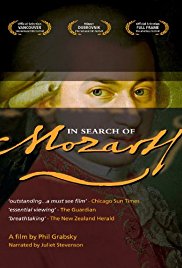 |
| In Search Of Mozart poster |
Does he think people will get more out of the paintings when they know more about who Monet was personally?
"Definitely. That’s a good question because I remember when I made a biography – the first of my composer biographies, about Mozart – and I used to say to people, ‘You can appreciate Mozart without knowing anything about him’. There are plenty of people who go to concerts – I talked to people at Mozart concerts as part of my research – and many of them knew very little beyond Amadeus about Mozart but they still appreciate the music. But my belief is, the more you know the biography, the more you understand who his peers were, what the context was, who he was comparing himself to and so on and so on, actually the richer the music becomes. And I think that’s absolutely true of painting.
"I think you can look at a Monet and appreciate it and all pictures have an immediate visceral impact on you one way or another, but when you look at a Monet and know what the location is and know who the people are in the painting and know that it’s his wife, who’s ill, or it’s his stepchild, or whatever it might be, know what he is trying to do in terms of his art, what is he trying to accomplish and why are there 20 different views of Rouen Cathedral, what’s that all about? So for me, in a sense, the basis of Exhibition on Screen is context and appreciation. What we are trying to do is encourage people to look. In this day and age, people just don’t look at stuff. We eat food without tasting it, we don’t talk to each other because we’re on our phones and so on. I want people to look at the paintings and then get an understanding of why these are great paintings."
One of the things that's interesting about this film is the way it draws out the relationships between artists working at the time, the way Monet refers to his peers and talks about or to them sometimes. Was that something that he was particularly interested in doing because of the way it links together different films in the series?
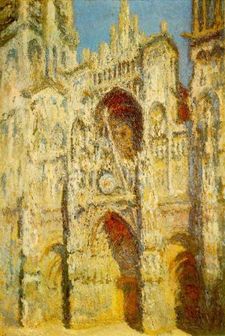 |
| Claude Monet's Rouen Cathedral In Full Sunlight - Harmony In Blue And Gold |
"Definitely – 100 per cent. It’s an absolute current theme that all great artists, just like all great composers, are passionate about what they do. Part of that passion is to look at the artists who have gone before them and the artists who are working in their own time. They are not in search of fame and fortune for the sake of it, they want to be the best artist they can possibly be. So Picasso spent time copying in the Prado, Cézanne spent time copying in the Louvre. Manet made his way to the Prado too, they all went to galleries. Monet’s no different. They would physically stand in the galleries and copy a Velasquez or a Courbet.
"I think it’s something we can learn from today. If you want to be a filmmaker, you have to watch the films of Cecil B DeMille. It’s no good coming to me and saying, ‘I’m a documentary maker because I own a stills camera that records video’. If you haven’t watched every documentary by Michael Moore, you haven’t done your research. Great artists do their research. They know the history of art. Hockney has written books about history of art. Because it feeds then into their art.
"It’s something I’m always trying to make reference to in the films, how important it is. I’m making a film now about Van Gogh and Japan. If you don’t understand the importance of the arrival of Japanese art in Paris in the 1860s and how artists like Monet were seeing it for the first time and how it utterly changed them... You can’t understand Van Gogh without understanding the influence of Japanese art."
So does he think it would be useful for people who have enjoyed the films to go back and watch them again when they’ve seen others in the series?
One hundred per cent. I think that if you have an interest in art, then any of these films you’ll find interesting. If you’re interested in art you should watch a film about Vermeer, Goya, Leonardo, Bosch."
I found it interesting the way that a lot of things in the film seem very modern despite the earlier context. That a lot of Monet’s experiences seem the same of artists today in terms of how he’s trying to get contracts and money and build his reputation. Was that something Phil was keen to bring out?
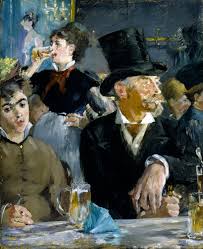 |
| Édouard Manet's Café Scenes |
"I wasn’t that I was keen to but it was there in the letters," he says. "I don’t start from the position of wanting to make any particular points. I don’t start by wanting to choose a particular theme over any others. I read the letters and see what comes through and it’s interesting that we have similar experiences. I remember reading the letters of Beethoven and thinking, ‘I’m going through the kind of thing he is’. The constant need for funding, chasing people who don’t pay you, chasing suppliers who get things wrong. You’re right, it’s a constancy.
"Some artists are lucky, Cézanne, Caillebotte, Manet in that they’re independently wealthy. But that’s important to know because that allows them earlier in their lives to more or less paint what they want to. Others have a real struggle, like Monet... and that affects what they paint. Again, with Monet, you can see his output changes as he starts to earn money, which also relates to your other question about cross-referencing the films. If you really want to understand the life of Monet, you need to watch the other film about the man who made the Impressionists, because the dealer Paul Durand-Durel, without him we wouldn’t be talking about the Impressionists I don’t think."
Cinema has often been treated as a poor relation in the arts in terms of the anticipated quality of its output. Has he found it difficult to put together art on screen and to get it taken seriously as a medium for talking about art, and does he think this series of films is changing people’s attitudes?
"When I first had this idea in 2009," he say, "there were raised eyebrows. People were saying, ‘Why would anyone want to go to the cinema to see an art exhibition?’. It is only seven years since our first film on Leonardo and nobody says that any more so there has been a change. We’re in 61 countries and the basic theme is, ‘We want more films, allow us to show them again, more often’. So I think that nobody questions it any more. We’re making films for the cinema, these are not walk-throughs of the exhibitions. We use the exhibitions as springboards to make cinematic biographical films about artists or artistic periods.
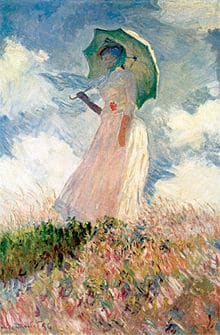 |
| Claude Monet's Giverny |
"Just as nobody questions opera, cinema and ballet in cinema any more, nobody questions art on film. Now, the thing about cinema is there are two overwhelming characteristics – good storytelling and, more broadly, there are good films and there are bad films. So, we spend a lot of time for each film thinking what is the best way to tell this story? and then we spend a lot of time trying to make the film good. But the audience has very quickly taken to this."
The films are always very densely packed with information. Is that something that comes from research for the film or is that drawing heavily on material already available?
"The amount of information to have in a film is a good question. I’ve been making films for 30 years and my first film was biography, which was densely packed with information. The subsequent films have been similar. You’ve got to be careful. I remember about 10 years ago reading a report that said two weeks after watching a film, people only remember two facts but they do remember the emotional impact of a film. Whether that’s true or not, I think there’s some validity in that. So, I’m having to think about the films on multiple levels and one of those is the long-term memory of the film. But as far as the information is concerned, I’m also having to think about two audiences. One is the audience who know something about the film and the other is the audience who just know the name of the artist. So there’s lots of balancing going on.
"We’re constantly having to decide, is that too much or too little information? It comes down to storytelling. First of all, we don’t want people to get lost so we’ve got to make sure people can follow the story. And, yes, we do a lot of our own research. We travel, talk to people, go to libraries, look at paintings and try to decide what we think is important and what we think is less important. What adds colour, what’s irrelevant... We don’t get audiences complaining that there’s too much information. Sometimes they say, ‘Can we look at the paintings for longer?’ but nobody ever says, ‘There’s too many facts’."
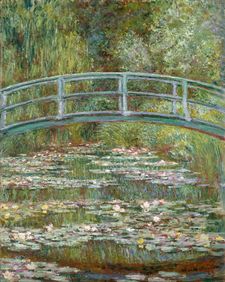 |
| Monet's Bridge Over A Pond Of Water Lilies |
Does you feel that the films are important in terms of democratising art and bringing it to people who wouldn’t have the chance to see it in this detail otherwise?
"I do up to a point. We are very lucky that we live in a world where, frankly, anyone can access art. You might live in a hut in the middle of the countryside, if you’ve got wifi, you’ve got books, postcards. So I don’t want to exaggerate what we do in terms of democratising, but we certainly can bring exhibitions. Ninety-five per cent of our audience are never going to get to see these exhibitions for various reasons – people in the Ukraine or New Zealand or South Africa are unlikely to come to see Hockney at the Royal Academy or whatever it is, so there’s that.
"More importantly, we’re trying to make non-disposable films. I’m trying to make films that, if the artist themselves was to see it, they’d think it was a fair reflection of what their life was, what they did, that there’s real value to what we do and in 20 years’ time people will still be watching. So far so good, our Leonardo film, our first one from 2011 is still being screened, not only in the cinema but on DVD and digital platforms, occasionally on television."
So does he see this as building up an archive tribute to these artists?
Definitely, but you’ve got to do it well. In my own professional career, the thing I’m most proud of is that four films that I made about composers – Mozart, Beethoven, Chopin and Haydn – each of those DVDs is on sale in the birthplace of that particular composer. They’ve got many to choose from. That’s the benchmark for us. In the Marmottan in Paris, they might have a couple of documentaries about Monet and I want to make sure that one of them is ours. We have the advantage that these are fantastic stories and the art is fantastic and still communicates. It might have been painted one or 200 years ago but the emotional content, narrative and impact of a painting remains just as important today. It doesn’t matter your demographic, it doesn’t matter who you are, where you live, age, sex or religion. The reason these are great artists is because they communicate with everybody. "
So what's next for the series?
"Well, the Monet film that’s just coming out now is the last of this current season and we are now in production for our next season, which is season six – films 20, 21 and 22. Degas, Young Picasso and Van Gogh In Japan and a repeat of a very popular film on Rembrandt."





















